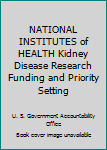National Institutes of Health Kidney Disease Research Funding and Priority Setting
The National Institutes of Health (NIH), within the Department of Health and Human Services, is the primary federal agency that conducts biomedical research on kidney disease, as well as various other diseases and conditions . NIH's budget -$30 billion in fiscal year 2015 -mostly funds extramural research that supports research personnel working at universities, medical schools, and other institutions. The National Institute of Diabetes and Digestive and Kidney Diseases (NIDDK)-one of NIH's 27 institutes and centers (IC) -has primary responsibility for kidney disease research . NIH funding for biomedical research on kidney disease in fiscal year 2015 was approximately $564 million-an increase of 2.7 percent from fiscal year 2014. NIDDK provided the majority ( 60 percent) of this funding, supporting a broad range of projects, such as chronic kidney disease, end- stage renal disease (ESRD) treatment, and kidney donation. GAO also reviewed NIH research funding levels for other diseases and conditions in the United States -those that are associated with high mortality or are among t he most prevalent chronic conditions . GAO found that funding for fiscal year 2015 varied widely among these diseases and conditions -for example, from $ 28 million for emphysema to nearly $5.4 billion for cancer . This variation in funding reflects a range of factors, including each IC's mission, budget, and research priorities .
Format:Paperback
Language:English
ISBN:1542653754
ISBN13:9781542653756
Release Date:January 2017
Publisher:CreateSpace Independent Publishing Platform
Length:34 Pages
Weight:0.31 lbs.
Dimensions:0.1" x 8.5"
Customer Reviews
0 rating





